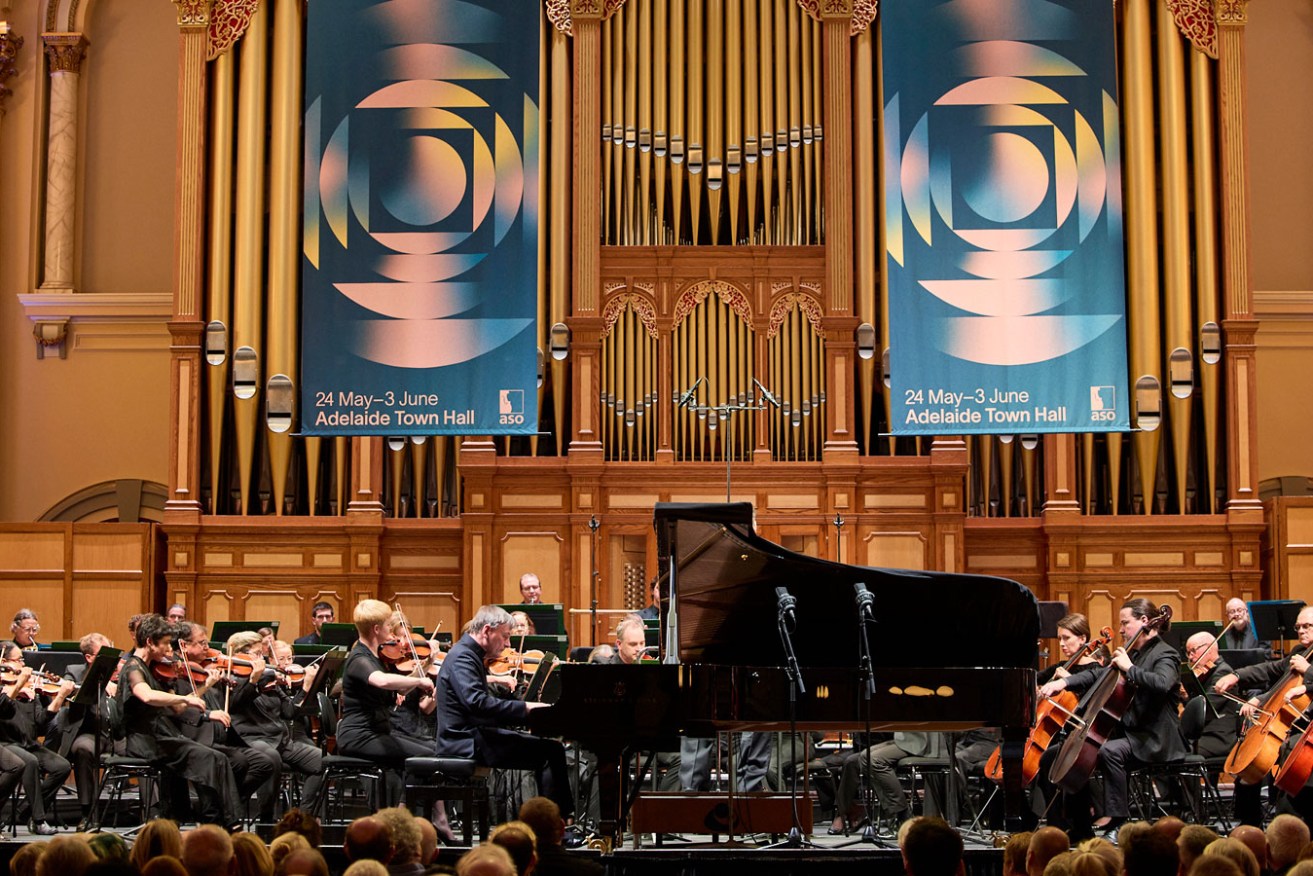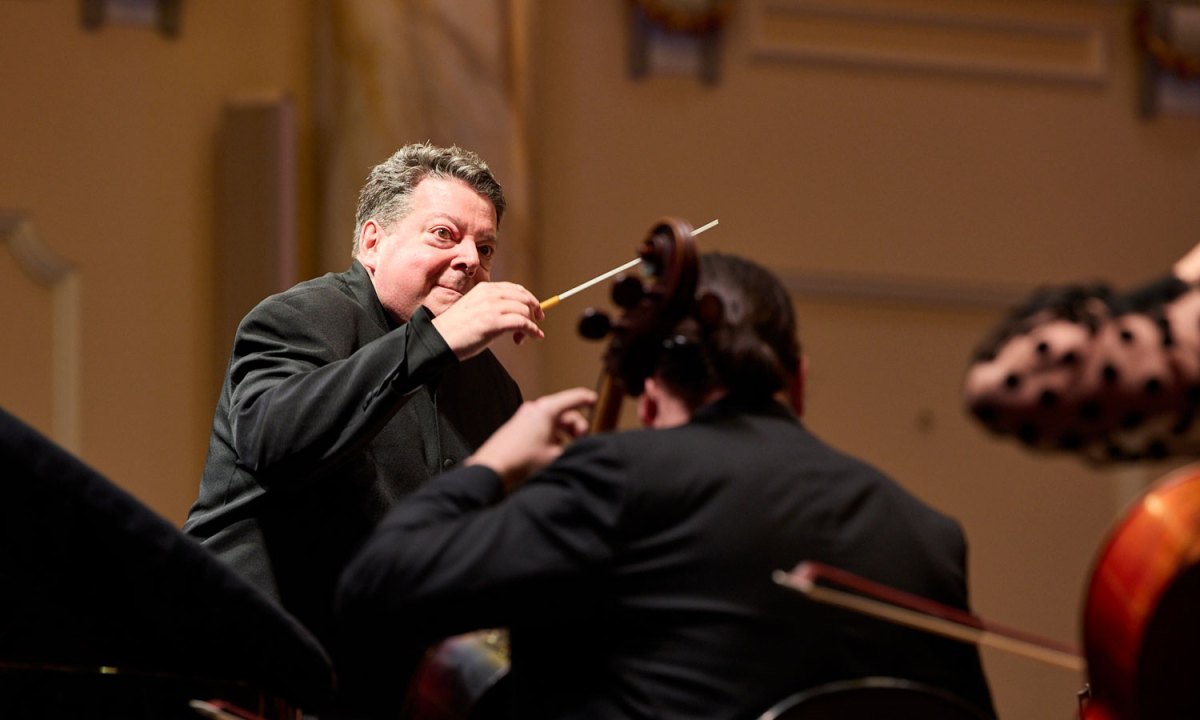Music review: Rachmaninov – The Piano Concertos 2
Rachmaninov’s Piano Concerto No.2 again found soloist Stephen Hough in powerful, glittering form with the ASO in a concert program that also featured a highly satisfying performance of Prokofiev’s Romeo and Juliet: Suite.


The Adelaide Symphony Orchestra is performing all four of Rachmaninov's piano concertos in a series of concerts with UK pianist Stephen Hough and American conductor Andrew Litton. Photo: Claudio Raschella / supplied
Having made such an impressive showing with Rachmaninov’s First Piano Concerto, it was now time to see how the combination of Stephen Hough (piano), Andrew Litton (conductor) and the Adelaide Symphony Orchestra would tackle the big one: Rach 2.
There is so much more to harness, so much inspiration to gather, to get this one right. Everybody has to be in roaring form.
A bit like magic, but mainly through determination and devotion, it happened. The Town Hall was scene to gushing strength, suave polish and the ripest beauty. In the first place, we can thank Rachmaninov’s hypnotherapist, Dr Nikolai Dahl, for having lifted him out of despair to compose Piano Concerto No.2 in C minor, Op.18, whose waves of glorious melody just keep rolling forth, and whose interweaving of piano and orchestra is nigh miraculous. (The work was, in fact, dedicated to Dahl.)
But in the second place, it was all down to insightful and exceptionally honed execution by Hough, Litton and the ASO.
Immediately, the first movement ignited with thunderous chords from the piano and a heavy tumult of strings: the tempo was faster than many other pianists would take it, but the sweep of energy was fully satisfying. Then, as the air cleared, Hough’s glistening finger-work and consummate shaping of line were there to admire, and as the movement accelerated towards its conclusion, his exacting rhythm was as well. The orchestra had to fight to stay with him in the closing bars – and only just made it. So exhilarating.
In that famous Adagio sostenuto, Hough emphasised the simplicity of its nostalgia-tinged main theme with rapture and a gathering intensity that allowed each phrase to curl at its apex before relaxing back down. His treatment of melody plus immaculate timing make him a most marvelous pianist for Rachmaninov.
The tie-ups with the orchestra in this middle movement were remarkable. It might seem a simple thing to accomplish on the face of it: after being introduced by flute and clarinet, the piano takes up the melody, and a lovely intimate exchange ensues with the orchestra with phrases being passed around. Usually there’s some give and take in how all it lines up, but here the changeovers were an order above: they were recording-studio perfect.
Indeed, Hough and Litton have pulled off this feat previously in their definitive recording of these concertos with the Dallas Symphony Orchestra for Hyperion, but total kudos to the ASO for doing this live. The precision was amazing – a joy to witness.
The finale was bracingly fast and bright. Yet another melody erupted with gushing force before they again raced thrillingly towards to finishing line.

Andrew Litton conducts the ASO. Photo: Claudio Raschella / supplied
Thence to Prokofiev’s Romeo and Juliet: Suite, and this was interestingly given in a version that Litton has arranged. Why doing such a thing is needed was initially baffling, because Prokofiev himself made three suites out of his much-loved ballet score. However, Litton’s reasons for doing so are all about which numbers to include as well as their order: improvements can be made, he argues. Thankfully, he does not change any of the orchestrations.
The main surprise is how it starts: Litton places the “Morning Dance” first, not the usual “Folk Dance”, but with good reason, as this item occurs near the start of the original ballet, whereas the “Folk Dance” actually appears in Act 2. The other movements follow in a plausible sequence, although ending with the “Death of Tybalt” feels a bit misplaced. Another advantage with Litton’s arrangement is that you get more of Prokofiev’s wonderful music than the composer gives you in any of his own suites: 10 movements, as opposed to six or seven.
To see the ASO players looking around smilingly to each other as they played was itself a reflection on how well this performance went. Prokofiev’s music expresses tragedy, but it is perhaps of the kids’ storybook kind, which only makes it more enchanting. Tuneful melodies and sheer fun abound; and these, together with his rugged, colourful orchestration, make Romeo and Juliet the masterpiece that it is.
Terrific playing in “Montagues and Capulets” saw the strings magically reveal themselves as a delicate shimmer under crashing fortissimos from the whole orchestra; and arrogantly strident rhythms from the brass and double basses gave this movement tremendous weighty power. Juliet’s depiction in solo flute, meanwhile, was immeasurably lovely.
This performance worked especially well for its evenness of tempi, and Litton’s direction continually reminded one that this, in the first place, is ballet music, not an orchestral showpiece to be pulled around for spectacular effect. It was a pleasure to see conductor and orchestra understanding each other so well.
The ASO’s Rachmaninov series is turning out to be a much bigger, festival-worthy event than one might have imagined, both on account of the unique Hough-Litton duo and the quality of the ASO’s playing.
The ASO’s Rachmaninov: The Piano Concertos, with pianist Stephen Hough and conductor Andrew Litton, continues with two further concerts on May 31 and June 3 in the Adelaide Town Hall.




